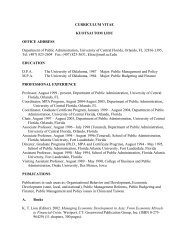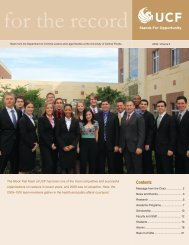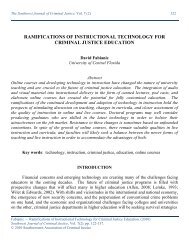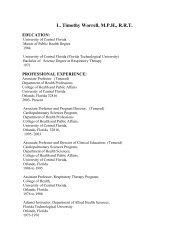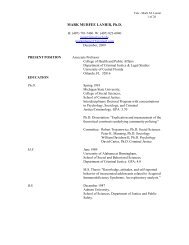Karl Marx and the Death Penalty - University of Central Florida
Karl Marx and the Death Penalty - University of Central Florida
Karl Marx and the Death Penalty - University of Central Florida
Create successful ePaper yourself
Turn your PDF publications into a flip-book with our unique Google optimized e-Paper software.
Crit Crim (2008) 16:285–291<br />
DOI 10.1007/s10612-008-9062-8<br />
<strong>Karl</strong> <strong>Marx</strong> <strong>and</strong> <strong>the</strong> <strong>Death</strong> <strong>Penalty</strong><br />
Robert M. Bohm<br />
Published online: 25 September 2008<br />
Ó Springer Science+Business Media B.V. 2008<br />
Abstract This study is a <strong>Marx</strong>ist analysis <strong>of</strong> capital punishment or <strong>the</strong> death penalty. The<br />
only detailed treatment <strong>of</strong> <strong>the</strong> subject by <strong>Marx</strong> appeared in an article published in <strong>the</strong> New<br />
York Daily Tribune, February 18, 1853, <strong>and</strong> that treatment was only a sketch. Thus, <strong>the</strong><br />
following study is an attempt to suggest what a reading <strong>of</strong> <strong>Marx</strong> may contribute to an<br />
underst<strong>and</strong>ing <strong>of</strong> capital punishment. I conclude that abolition <strong>of</strong> <strong>the</strong> death penalty does not<br />
need a <strong>Marx</strong>ist justification, but a <strong>Marx</strong>ist justification adds to <strong>the</strong> many arguments for that<br />
course <strong>of</strong> action.<br />
Introduction<br />
It is remarkable that <strong>Karl</strong> <strong>Marx</strong>, who wrote so little about crime <strong>and</strong> punishment, has had<br />
such an extraordinary influence on <strong>the</strong> subjects. His work has inspired a voluminous<br />
literature <strong>of</strong> <strong>Marx</strong>ist (or radical or critical) criminology. Still, that <strong>Marx</strong>ist criminological<br />
literature is conspicuous for its relative dearth <strong>of</strong> capital-punishment analysis. The purpose<br />
<strong>of</strong> this study is to suggest what a reading <strong>of</strong> <strong>Marx</strong> may contribute to an underst<strong>and</strong>ing <strong>of</strong><br />
capital punishment.<br />
<strong>Marx</strong> on <strong>the</strong> <strong>Death</strong> <strong>Penalty</strong><br />
<strong>Marx</strong>’s most detailed thoughts on capital punishment appeared in an article published in<br />
<strong>the</strong> New York Daily Tribune, February 18, 1853 (<strong>Marx</strong> 1853). He constructed <strong>the</strong> article in<br />
<strong>the</strong> following way. First, he provided examples <strong>of</strong> cases that showed that <strong>the</strong> death penalty<br />
had a counter-deterrent or brutalizing effect; that is, that executions cause murders. He also<br />
presented data showing that murders <strong>and</strong> suicides ‘‘follow closely <strong>the</strong> execution <strong>of</strong><br />
R. M. Bohm (&)<br />
Department <strong>of</strong> Criminal Justice <strong>and</strong> Legal Studies, <strong>University</strong> <strong>of</strong> <strong>Central</strong> <strong>Florida</strong>, Orl<strong>and</strong>o,<br />
FL 32816, USA<br />
e-mail: rbohm@mail.ucf.edu<br />
123
286 R. M. Bohm<br />
criminals.’’ <strong>Marx</strong> was not <strong>the</strong> first to observe this counter-deterrent effect, but he was one<br />
<strong>of</strong> <strong>the</strong> earliest to write about it. Dr. Benjamin Rush, for example, <strong>the</strong> putative founder <strong>of</strong><br />
<strong>the</strong> American death penalty abolitionist movement, noted in <strong>the</strong> late eighteenth century that<br />
capital punishment might increase crime (Filler 1967, p. 106; Gorecki 1983, p. 85).<br />
As for <strong>the</strong> deterrent effect <strong>of</strong> punishment, <strong>Marx</strong> noted that ‘‘since Cain <strong>the</strong> world has<br />
been nei<strong>the</strong>r intimidated or [sic] ameliorated by punishment.’’ Again, <strong>Marx</strong> was not <strong>the</strong><br />
first to question <strong>the</strong> deterrent effect <strong>of</strong> capital punishment, but he was an early skeptic. His<br />
views have subsequently been validated. According to U.S. Supreme Court Justice John<br />
Paul Stevens in his recent opinion in Baze v. Rees (553 U.S. __, 2008): ‘‘Despite 30 years<br />
<strong>of</strong> empirical research in <strong>the</strong> area, <strong>the</strong>re remains no reliable statistical evidence that capital<br />
punishment in fact deters potential <strong>of</strong>fenders.’’ In 1989, following a comprehensive review<br />
<strong>of</strong> death penalty research by a panel <strong>of</strong> distinguished scholars, <strong>the</strong> American Society <strong>of</strong><br />
Criminology passed a resolution condemning capital punishment <strong>and</strong> calling for its abolition.<br />
Among <strong>the</strong> reasons for <strong>the</strong> Society’s position was <strong>the</strong> absence <strong>of</strong> ‘‘consistent<br />
evidence <strong>of</strong> crime deterrence through execution’’ (Petersilia 1990, p. 1). A recent survey <strong>of</strong><br />
67 current <strong>and</strong> past presidents <strong>of</strong> <strong>the</strong> top three criminology pr<strong>of</strong>essional organizations—<strong>the</strong><br />
American Society <strong>of</strong> Criminology, <strong>the</strong> Academy <strong>of</strong> Criminal Justice Sciences, <strong>and</strong> <strong>the</strong> Law<br />
<strong>and</strong> Society Association—found that about 80% <strong>of</strong> <strong>the</strong>m believe that <strong>the</strong> death penalty is<br />
no greater a deterrent to homicide than long imprisonment’’ (Radelet <strong>and</strong> Akers 1996).<br />
This latter observation focuses on capital punishment’s marginal deterrent effect; that is,<br />
whe<strong>the</strong>r capital punishment has a greater deterrent effect than non-capital punishments<br />
such as life imprisonment without opportunity for parole. There is no evidence that capital<br />
punishment has a marginal deterrent effect.<br />
Second, <strong>Marx</strong> criticized both Kant <strong>and</strong> Hegel’s German idealism regarding <strong>the</strong>ir beliefs<br />
about free will <strong>and</strong> self-determination. <strong>Marx</strong>’s ontology was different. In The German<br />
Ideology, <strong>Marx</strong> wrote, ‘‘It is clear … that individuals certainly make one ano<strong>the</strong>r, physically<br />
<strong>and</strong> mentally, but do not make <strong>the</strong>mselves’’ (<strong>Marx</strong> <strong>and</strong> Engels 1976, pp. 55–56,<br />
emphasis in original). In <strong>the</strong> article, <strong>Marx</strong> also cited favorably <strong>the</strong> work <strong>of</strong> <strong>the</strong> positivist<br />
<strong>and</strong> ‘‘moral statistician’’ Adolphe Quetelet, who showed <strong>the</strong> regularity <strong>of</strong> both <strong>the</strong> amount<br />
<strong>and</strong> type <strong>of</strong> crime in a ‘‘modern bourgeois society’’ (referring to France <strong>and</strong> <strong>the</strong> United<br />
States in <strong>the</strong> early nineteenth century). It was Quetelet, incidentally, that observed early on<br />
that a key factor in violent crime was ‘‘relative poverty,’’ where <strong>the</strong>re is great inequality<br />
between poverty <strong>and</strong> wealth in <strong>the</strong> same area. According to Quetelet, relative poverty<br />
incited people through jealousy to commit violent crimes. This was especially true, surmised<br />
Quetelet, where changing economic conditions caused <strong>the</strong> impoverishment <strong>of</strong> some<br />
people while o<strong>the</strong>rs retained <strong>the</strong>ir wealth (Taylor et al. 1974, pp. 37–38; Vold <strong>and</strong> Bernard<br />
1986, pp. 131–132). Quetelet’s formulation is consistent with <strong>Marx</strong>ist analysis; fur<strong>the</strong>rmore,<br />
<strong>the</strong> idea that ‘‘relative poverty’’ or ‘‘relative deprivation’’ is a cause <strong>of</strong> crime has<br />
been adopted by current critical or <strong>Marx</strong>ist criminologists (see, for example, Young 1997,<br />
p. 30).<br />
Third, <strong>Marx</strong> argued that ‘‘punishment is nothing but a means <strong>of</strong> society to defend itself<br />
against <strong>the</strong> infraction <strong>of</strong> its vital conditions, whatever may be <strong>the</strong>ir character.’’ He <strong>the</strong>n<br />
quipped, taking a poke at capitalism, ‘‘is <strong>the</strong>re not a necessity for deeply reflecting upon an<br />
alteration <strong>of</strong> <strong>the</strong> system that breeds <strong>the</strong>se crimes, instead <strong>of</strong> glorifying <strong>the</strong> hangman who<br />
executes a lot <strong>of</strong> criminals to make room only for <strong>the</strong> supply <strong>of</strong> new ones’’ <strong>Marx</strong><br />
maintained that one would be hard pressed to find a use for capital punishment in a society<br />
‘‘glorying in its civilization.’’ In that respect, he shared <strong>the</strong> viewpoint, attributed to both<br />
Fyodor Dostoevsky <strong>and</strong> Winston Churchill, that: ‘‘The mood <strong>and</strong> temper <strong>of</strong> <strong>the</strong> public with<br />
123
<strong>Karl</strong> <strong>Marx</strong> <strong>and</strong> <strong>the</strong> <strong>Death</strong> <strong>Penalty</strong> 287<br />
regard to <strong>the</strong> treatment <strong>of</strong> crime <strong>and</strong> criminals is one <strong>of</strong> <strong>the</strong> most unfailing tests <strong>of</strong> <strong>the</strong><br />
civilization <strong>of</strong> any country.’’<br />
<strong>Marx</strong> believed that capitalism produces an amount <strong>and</strong> type <strong>of</strong> crime that it punishes.<br />
One <strong>of</strong> <strong>the</strong> roles <strong>of</strong> <strong>the</strong> state is to determine guilt <strong>and</strong> administer punishment. Capital<br />
punishment is <strong>the</strong> state’s ultimate sanction <strong>and</strong> means <strong>of</strong> coercion <strong>and</strong> is generally reserved<br />
for <strong>the</strong> most heinous crimes, as defined by <strong>the</strong> state, but not necessarily <strong>the</strong> most serious<br />
harms. <strong>Marx</strong> apparently expected heinous crime in capitalist societies <strong>and</strong> <strong>the</strong> death<br />
penalty as a means by which <strong>the</strong> capitalist state would deal with it.<br />
<strong>Death</strong>-Eligible Crime<br />
Following Friedrich Engels’ description <strong>of</strong> <strong>the</strong> causes <strong>of</strong> crime in The Condition <strong>of</strong> <strong>the</strong><br />
Working Class in Engl<strong>and</strong> (1968, pp. 145–146), <strong>Marx</strong>ist criminologists have argued<br />
that ‘‘senseless’’ <strong>and</strong> heinous violent crime—<strong>the</strong> type <strong>of</strong> crime most likely to be dea<strong>the</strong>ligible—is<br />
a product <strong>of</strong> <strong>the</strong> demoralizing <strong>and</strong> brutalizing conditions under which many<br />
people are forced to live in a capitalist society. As criminologists Taylor, Walton, <strong>and</strong><br />
Young explain, ‘‘It is not that man behaves as an animal because <strong>of</strong> his ‘nature’ [under<br />
capitalism]: it is that he is not fundamentally allowed by virtue <strong>of</strong> <strong>the</strong> social arrangements<br />
<strong>of</strong> production to do o<strong>the</strong>rwise’’ (1975, p. 23). Recent estimates provide support for this<br />
contention. Nationwide, about 40% <strong>of</strong> all capital indictments are for felony murder, i.e., a<br />
murder committed during <strong>the</strong> commission <strong>of</strong> ano<strong>the</strong>r felony such as armed robbery<br />
(Walker 2006), <strong>and</strong> many o<strong>the</strong>r death-eligible murders are <strong>the</strong> result <strong>of</strong> ‘‘collateral<br />
damage’’ in <strong>the</strong> illicit drug trade.<br />
Not long ago, criminologist Elliott Currie specified seven elements <strong>of</strong> ‘‘market societies’’<br />
or ‘‘capitalist societies’’ that he believed, in combination, are likely to breed serious<br />
violent crime. They are:<br />
(1) ‘‘<strong>the</strong> progressive destruction <strong>of</strong> livelihood’’ (<strong>the</strong> absence <strong>of</strong> steady well-paying work);<br />
(2) ‘‘<strong>the</strong> growth <strong>of</strong> extremes <strong>of</strong> economic inequality <strong>and</strong> material deprivation’’;<br />
(3) ‘‘<strong>the</strong> withdrawal <strong>of</strong> public services <strong>and</strong> supports, especially for families <strong>and</strong><br />
children’’;<br />
(4) ‘‘<strong>the</strong> erosion <strong>of</strong> informal <strong>and</strong> communal networks <strong>of</strong> mutual support, supervision, <strong>and</strong><br />
care’’;<br />
(5) ‘‘<strong>the</strong> spread <strong>of</strong> a materialistic, neglectful, <strong>and</strong> ‘hard’ culture’’ (<strong>the</strong> exaltation <strong>of</strong> ‘‘<strong>of</strong>ten<br />
brutal individual competition <strong>and</strong> consumption over <strong>the</strong> values <strong>of</strong> community,<br />
contribution, <strong>and</strong> productive work’’);<br />
(6) ‘‘<strong>the</strong> unregulated marketing <strong>of</strong> <strong>the</strong> technology <strong>of</strong> violence’’ (<strong>the</strong> absence <strong>of</strong> public<br />
regulation <strong>of</strong> firearms); <strong>and</strong>, not least<br />
(7) ‘‘<strong>the</strong> weakening <strong>of</strong> social <strong>and</strong> political alternatives’’ (which inhibits people most ‘‘at<br />
risk’’ from defining <strong>the</strong>ir problems in collective terms <strong>and</strong> envisioning a collective<br />
response) (Currie 1997a; also see Currie 1997b).<br />
Although one may agree with <strong>the</strong> <strong>Marx</strong>ist analysis that capitalist societies breed serious<br />
violent crime, it does not necessarily follow that capitalist societies must respond to serious<br />
violent crime with capital punishment, as history clearly demonstrates. Nor is it to suggest<br />
that state-socialist societies should be free <strong>of</strong> serious violent crime, as history also attests.<br />
Ra<strong>the</strong>r, for <strong>Marx</strong>ist criminologists, compared to capitalist societies, state-socialist societies<br />
should have a different amount <strong>and</strong> type <strong>of</strong> serious violent crime because <strong>of</strong> <strong>the</strong> less intense<br />
class struggle in state-socialist societies (see Chambliss 1976, p. 9). State-socialist<br />
123
288 R. M. Bohm<br />
societies, especially in <strong>the</strong>ir early transitional years, are likely to experience some residual<br />
‘‘bourgeois crime’’ <strong>and</strong> capital punishment. History also demonstrates <strong>the</strong> use <strong>of</strong> capital<br />
punishment by new leaders <strong>of</strong> state-socialist societies to rid <strong>the</strong>mselves <strong>of</strong> <strong>the</strong>ir political<br />
enemies. However, once state-socialist societies are more entrenched, <strong>the</strong>y <strong>of</strong>ten abolish<br />
capital punishment, at least for short periods <strong>of</strong> time. For example, <strong>the</strong> Second Congress <strong>of</strong><br />
Soviets abolished <strong>the</strong> death penalty in November 1917, only to reinstate it by 1922; even<br />
Stalin repealed <strong>the</strong> death penalty in 1947, but reinstated it in 1950 for political crimes<br />
(Caffentzis 2000).<br />
Species-Beings <strong>and</strong> Capital Punishment<br />
For <strong>Marx</strong>, state socialism is only a transitional stage to communism, as capitalism is a<br />
transitional stage to socialism. <strong>Marx</strong>’s vision was that in <strong>the</strong> higher stages <strong>of</strong> a statelesscommunist<br />
society (<strong>Marx</strong>’s ‘‘wi<strong>the</strong>ring away <strong>of</strong> <strong>the</strong> state’’), <strong>the</strong>re would be no need for<br />
capital punishment (a tool <strong>of</strong> <strong>the</strong> state) because oppositional classes <strong>and</strong> ‘‘bourgeois<br />
criminality’’ would disappear <strong>and</strong> human beings would be ‘‘species-beings.’’ <strong>Marx</strong><br />
assumed that human beings were inherently good (a la Rousseau) <strong>and</strong> that society corrupted<br />
<strong>the</strong>m. Even if human beings were simply a product <strong>of</strong> <strong>the</strong>ir experiences (a la Locke),<br />
a corrupt society would still corrupt many <strong>of</strong> <strong>the</strong>m.<br />
An interesting question is: what is it about ‘‘species-being’’ that makes capital punishment<br />
superfluous <strong>Marx</strong> appropriated <strong>the</strong> concept <strong>of</strong> ‘‘species-being’’ from German<br />
philosopher Ludwig Feuerbach, who, in The Essence <strong>of</strong> Christianity, wrote that what<br />
distinguishes human beings from animals is not consciousness per se but ra<strong>the</strong>r a particular<br />
kind <strong>of</strong> consciousness. This ‘‘human consciousness’’ is not just consciousness <strong>of</strong> <strong>the</strong><br />
individual as an individual, but also <strong>the</strong> consciousness <strong>of</strong> an individual as a member <strong>of</strong> <strong>the</strong><br />
human species whose ‘‘human essence’’ is <strong>the</strong> same as that <strong>of</strong> o<strong>the</strong>r human beings<br />
(Bottomore 1963, p. 13, n. 2). <strong>Marx</strong> added to Feurbach’s original formulation <strong>the</strong> belief<br />
that human beings are only living <strong>and</strong> acting au<strong>the</strong>ntically, i.e., in accordance with <strong>the</strong>ir<br />
nature, when <strong>the</strong>y are deliberately living <strong>and</strong> acting as ‘‘species-beings’’ or ‘‘social beings’’<br />
(Bottomore 1963, p. 13, n. 2). In his essay, ‘‘On <strong>the</strong> Jewish Question,’’ <strong>Marx</strong> wrote that in<br />
capitalist societies human beings are far from ‘‘species-beings.’’ In capitalist societies,<br />
human beings are egoistic, separated from <strong>the</strong> community, withdrawn into <strong>the</strong>mselves,<br />
wholly preoccupied with <strong>the</strong>ir private interest, <strong>and</strong> act in accordance with <strong>the</strong>ir private<br />
caprice (Bottomore 1963, p. 26). The only bond between human beings in capitalist<br />
societies is natural necessity, need <strong>and</strong> private interest, <strong>the</strong> preservation <strong>of</strong> <strong>the</strong>ir property,<br />
<strong>and</strong> <strong>the</strong>ir egoistic selves (Bottomore 1963, p. 26). In <strong>the</strong> Economic <strong>and</strong> Philosophical<br />
Manuscripts, <strong>Marx</strong> wrote about alienated labor (in capitalist societies). It is here that <strong>Marx</strong><br />
explains that alienated labor alienates nature from human beings; alienates human beings<br />
from <strong>the</strong>mselves, from <strong>the</strong>ir own active functions, <strong>the</strong>ir life activities; <strong>and</strong>, in so doing,<br />
alienates human beings from each o<strong>the</strong>r, <strong>the</strong>ir species (Bottomore 1963, p. 127). For <strong>Marx</strong>,<br />
alienated labor is characterized by work that:<br />
(1) ‘‘is external to <strong>the</strong> worker, that it is not part <strong>of</strong> his nature; <strong>and</strong> that consequently, he<br />
does not fulfil [sic] himself in his work but denies himself, has a feeling <strong>of</strong> misery<br />
ra<strong>the</strong>r than well-being, does not develop freely his mental <strong>and</strong> physical energies but is<br />
physically exhausted <strong>and</strong> mentally debased’’;<br />
(2) ‘‘his work is not voluntary but imposed, forced labour. It is not <strong>the</strong> satisfaction <strong>of</strong> a<br />
need, but only a means for satisfying o<strong>the</strong>r needs. Its alien character is clearly shown<br />
123
<strong>Karl</strong> <strong>Marx</strong> <strong>and</strong> <strong>the</strong> <strong>Death</strong> <strong>Penalty</strong> 289<br />
by <strong>the</strong> fact that as soon as <strong>the</strong>re is no physical or o<strong>the</strong>r compulsion it is avoided like<br />
<strong>the</strong> plague’’;<br />
(3) ‘‘<strong>the</strong> external character <strong>of</strong> work for <strong>the</strong> worker is shown by <strong>the</strong> fact it is not his own<br />
work but work for someone else, that in work he does not belong to himself but to<br />
ano<strong>the</strong>r person’’ (Bottomore 1963, pp. 124–125, emphases in original).<br />
<strong>Marx</strong> concludes that human beings (workers) in capitalist societies feel freely active only<br />
in <strong>the</strong>ir animal functions—eating, drinking <strong>and</strong> procreating, or at most in <strong>the</strong>ir dwellings<br />
<strong>and</strong> in personal adornment—while in <strong>the</strong>ir human functions, <strong>the</strong>y are reduced to animals<br />
(Bottomore 1963, p. 125). Under such conditions, serious violent crime is not surprising.<br />
Communism <strong>and</strong> Capital Punishment<br />
For <strong>Marx</strong>, ‘‘communism is <strong>the</strong> positive abolition <strong>of</strong> private property’’ <strong>and</strong>, for <strong>the</strong> purposes<br />
<strong>of</strong> this analysis, ‘‘<strong>of</strong> human self-alienation … . It is, <strong>the</strong>refore, <strong>the</strong> return <strong>of</strong> man himself as<br />
a social, i.e., really human, being, a complete <strong>and</strong> conscious return which assimilates all<br />
<strong>the</strong> wealth <strong>of</strong> previous development’’ (Bottomore 1963, p. 155, emphasis in original).<br />
Communism, writes <strong>Marx</strong>, ‘‘is <strong>the</strong> definitive resolution <strong>of</strong> <strong>the</strong> antagonism between man <strong>and</strong><br />
nature, <strong>and</strong> between man <strong>and</strong> man. It is <strong>the</strong> true solution <strong>of</strong> <strong>the</strong> conflict between existence<br />
<strong>and</strong> essence, between objectification <strong>and</strong> self-affirmation, between freedom <strong>and</strong> necessity,<br />
between individual <strong>and</strong> species’’ (Bottomore 1963, p. 155, emphasis in original). In a<br />
communist society, according to <strong>Marx</strong>, ‘‘competition as we know it has given way to<br />
cooperation as we have still to learn about it’’ (Ollman 1976, p. 106).<br />
A communist society would have no need for capital punishment <strong>and</strong> no state to<br />
administer it. Capital punishment would also be counterproductive in <strong>the</strong> transition from a<br />
state-socialist society to a communist society because, during <strong>the</strong> transition, capital<br />
<strong>of</strong>fenders would play an important, constructive <strong>and</strong> educational role (see Gordon 1976,<br />
p. 210). During <strong>the</strong> transition, capital <strong>of</strong>fenders ‘‘would be treated in <strong>the</strong> ways that many<br />
families deal with those family members who betray <strong>the</strong> family trust’’ (Gordon 1976,<br />
p. 210). Society would admit its collective failure <strong>and</strong>, with <strong>the</strong> help <strong>of</strong> <strong>the</strong> <strong>of</strong>fender, seek<br />
ways to reform <strong>the</strong> total community (see Gordon 1976, p. 210).<br />
Currie believes that, at present, <strong>the</strong> most promising lever <strong>of</strong> change <strong>and</strong>, at <strong>the</strong> same<br />
time, <strong>the</strong> most effective means to significantly reduce serious violent crime, is ‘‘full<br />
employment at socially meaningful work at good wages, <strong>and</strong> with reasonable hours’’<br />
(Currie 1997a, p. 168). Such a policy would require ‘‘substantially exp<strong>and</strong>ing employment<br />
in <strong>the</strong> public <strong>and</strong> nonpr<strong>of</strong>it sectors <strong>of</strong> <strong>the</strong> economy, <strong>and</strong> developing policies for worksharing<br />
<strong>and</strong> reduction <strong>of</strong> work time’’ (Currie 1997a, p. 168). It is important to emphasize,<br />
as Currie does, that full employment, etc., as a means to reduce serious violent crime is a<br />
reform for <strong>the</strong> present (during <strong>the</strong> capitalist transition to socialism) <strong>and</strong> probably during<br />
state-socialism as well. However, as I have argued elsewhere (Bohm 1984), it is not <strong>the</strong><br />
long-term solution; communism is.<br />
Critique<br />
If <strong>Marx</strong> expected capital punishment in capitalist societies, which it appears he did, he was<br />
wrong. Nearly all advanced capitalist societies, with <strong>the</strong> notable exceptions <strong>of</strong> <strong>the</strong> United<br />
States <strong>and</strong> Japan, have ab<strong>and</strong>oned capital punishment, as have most state-socialist<br />
123
290 R. M. Bohm<br />
societies. Some prominent political <strong>and</strong> economic conservatives, such as George Will,<br />
William F. Buckley, Jr., Pat Robertson, <strong>and</strong> Milton Friedman, have questioned <strong>the</strong> death<br />
penalty because <strong>of</strong> what <strong>the</strong>y perceive as <strong>the</strong> enormous waste <strong>of</strong> capital it consumes <strong>and</strong> <strong>the</strong><br />
havoc it wrecks on <strong>the</strong> administration <strong>of</strong> justice, among o<strong>the</strong>r reasons.<br />
Critics <strong>of</strong> <strong>Marx</strong> can point to <strong>the</strong> use <strong>of</strong> capital punishment in so-called socialist or<br />
communist nations, such as <strong>the</strong> former Soviet Union, China, North Korea, <strong>and</strong> Cuba.<br />
However, none <strong>of</strong> those nations were or are truly socialist or communist, at least as <strong>Marx</strong><br />
had originally conceived <strong>the</strong> terms. It is unfair to look to <strong>the</strong> totalitarian nations that were<br />
or are socialist or communist in name only for guidance in dealing with <strong>the</strong> crime <strong>and</strong><br />
punishment problems <strong>of</strong> capitalist societies.<br />
Today, it probably makes little sense to speak <strong>of</strong> capitalist <strong>and</strong> socialist societies<br />
anyway, because no pure societies <strong>of</strong> ei<strong>the</strong>r type exist (<strong>the</strong>y probably never did.). All<br />
countries now manifest elements <strong>of</strong> both capitalism <strong>and</strong> socialism. In <strong>the</strong> United States, for<br />
example, Social Security, Medicare, Medicaid, <strong>and</strong> o<strong>the</strong>r social programs, such as public<br />
education, public libraries, public parks, <strong>and</strong> public highways, provided by federal, state,<br />
<strong>and</strong> local governments are clearly socialistic. Even so-called corporate welfare, such as <strong>the</strong><br />
many subsidies <strong>and</strong> tax loopholes for corporations, is socialistic. At <strong>the</strong> beginning <strong>of</strong> <strong>the</strong><br />
twenty-first century, all countries have ‘‘mixed’’ economies, with elements <strong>of</strong> both capitalism<br />
<strong>and</strong> socialism. Thus, it may make more sense to refer to capitalist-dominated<br />
societies <strong>and</strong> socialist-dominated societies.<br />
What may be occurring in <strong>the</strong> world at present is <strong>the</strong> transition <strong>of</strong> advanced<br />
state-capitalist-dominated societies, such as <strong>the</strong> United States <strong>and</strong> Great Britain, to<br />
state-socialist-dominated societies, <strong>and</strong> <strong>the</strong> transition <strong>of</strong> what are erroneously called statesocialist<br />
societies, such as Russia <strong>and</strong> China, to <strong>the</strong> early stages <strong>of</strong> capitalism. The capitalist-to-socialist<br />
transition was predicted by <strong>Marx</strong>, but <strong>Marx</strong> never dreamed that societies<br />
would try to skip necessary stages <strong>of</strong> development, as was done in all supposedly statesocialist<br />
or ‘‘state-communist’’ societies. The adoption <strong>of</strong> <strong>the</strong> free enterprise system<br />
(capitalism) by former supposedly state-socialist or state-communist societies is simply <strong>the</strong><br />
result <strong>of</strong> a long overdue recognition by such societies that capitalism is a necessary<br />
transitional stage, as <strong>Marx</strong> originally had argued.<br />
Critics <strong>of</strong> <strong>Marx</strong> also contend that his communist vision is utopian. However, in The<br />
German Ideology, <strong>Marx</strong> (<strong>and</strong> Engels) argued that communism is nei<strong>the</strong>r ‘‘a ‘state <strong>of</strong><br />
affairs’ which is to be established’’ or ‘‘an ‘ideal’ to which reality [will] have to adjust<br />
itself,’’ but ra<strong>the</strong>r ‘‘<strong>the</strong> ‘real’ movement which abolishes <strong>the</strong> present state <strong>of</strong> things’’ (<strong>Marx</strong><br />
<strong>and</strong> Engels 1976, pp. 56–57). The reason communism is not utopian for <strong>Marx</strong> is because<br />
<strong>the</strong> factors, in <strong>the</strong> absence <strong>of</strong> which communism is impossible, exist as potential within <strong>the</strong><br />
conditions now in existence. However, while ‘‘communist factors’’ may indeed exist as<br />
potential within <strong>the</strong> conditions now in existence, <strong>Marx</strong>’s apparent belief that <strong>the</strong> potential<br />
will inevitably be realized betrays his own idealism.<br />
Conclusion<br />
Abolition <strong>of</strong> <strong>the</strong> death penalty does not need a <strong>Marx</strong>ist justification, but a <strong>Marx</strong>ist justification<br />
adds to <strong>the</strong> many arguments for that course <strong>of</strong> action. It is noteworthy in that regard<br />
that one <strong>of</strong> <strong>the</strong> most politically conservative institutions in society—<strong>the</strong> Roman Catholic<br />
Church—is one with <strong>the</strong> politically radical ideology <strong>of</strong> <strong>Marx</strong>ism in opposing capital<br />
punishment. If <strong>Marx</strong>ists <strong>and</strong> <strong>the</strong> Pope can find common ground on <strong>the</strong> issue <strong>of</strong> capital<br />
123
<strong>Karl</strong> <strong>Marx</strong> <strong>and</strong> <strong>the</strong> <strong>Death</strong> <strong>Penalty</strong> 291<br />
punishment, <strong>the</strong>n it seems inevitable that those in <strong>the</strong> middle <strong>of</strong> <strong>the</strong> two political extremes<br />
eventually will also see <strong>the</strong> wisdom <strong>of</strong> abolishing <strong>the</strong> death penalty.<br />
References<br />
Bohm, R. M. (1984). Beyond employment: Toward a radical solution to <strong>the</strong> crime problem. Crime <strong>and</strong><br />
Social Justice, 21–22, 213–222.<br />
Bottomore, T. B. (Ed.). (1963). <strong>Karl</strong> <strong>Marx</strong>: Early writings (T. B. Bottomore, Trans.). New York: McGraw-<br />
Hill.<br />
Caffentzis, G. (2000). Report on death penalty in Cuba dialogue. www.ocf.berkeley.edu/*marto/adpp/<br />
cuba.htm. Accessed 10 Sept 2007.<br />
Chambliss, W. J. (1976). Functional <strong>and</strong> conflict <strong>the</strong>ories <strong>of</strong> crime: The heritage <strong>of</strong> Emile Durkheim <strong>and</strong><br />
<strong>Karl</strong> <strong>Marx</strong>. In W. J. Chambliss & M. Mank<strong>of</strong>f (Eds.), Whose law what order (pp. 1–28). New York:<br />
Wiley.<br />
Currie, E. (1997a). Market, crime <strong>and</strong> community: Toward a mid-range <strong>the</strong>ory <strong>of</strong> post-industrial violence.<br />
Theoretical Criminology, 1, 147–172.<br />
Currie, E. (1997b). Market society <strong>and</strong> social disorder. In B. D. MacLean & D. Milovanovic (Eds.), Thinking<br />
critically about crime (pp. 37–42). Vancouver, BC: Collective Press.<br />
Engels, F. (1968). The condition <strong>of</strong> <strong>the</strong> working class in Engl<strong>and</strong> (W.O. Henderson & W. H. Chaloner,<br />
Trans.). Stanford, CA: Stanford <strong>University</strong> Press.<br />
Filler, L. (1967). Movements to abolish <strong>the</strong> death penalty in <strong>the</strong> United States. In T. Sellin (Ed.), Capital<br />
punishment (pp. 104–122). New York: Harper & Row.<br />
Gordon, D. M. (1976). Class <strong>and</strong> <strong>the</strong> economics <strong>of</strong> crime. In W. J. Chambliss & M. Mank<strong>of</strong>f (Eds.), Whose<br />
law what order (pp. 193–214). New York: Wiley.<br />
Gorecki, J. (1983). Capital punishment: Criminal law <strong>and</strong> social evolution. New York: Columbia <strong>University</strong><br />
Press.<br />
<strong>Marx</strong>, K. (1853). New York Daily Tribune article on <strong>the</strong> death penalty. www.marxists.org/archive/<br />
marx/works/1853/02/18.htm.<br />
<strong>Marx</strong>, K., & Engels, F. (1976). The German ideology. New York: International.<br />
Ollman, B. (1976). Alienation (2nd ed.). Cambridge: Cambridge <strong>University</strong> Press.<br />
Petersilia, J. (1990). <strong>Death</strong> penalty resolution debated <strong>and</strong> endorsed. The Criminologist, 15, 1.<br />
Radelet, M. L., & Akers, R. L. (1996). Deterrence <strong>and</strong> <strong>the</strong> death penalty: The view <strong>of</strong> <strong>the</strong> experts. Journal <strong>of</strong><br />
Criminal Law <strong>and</strong> Criminology, 87, 1–16.<br />
Taylor, I., Walton, P., & Young, J. (1974). The new criminology: For a social <strong>the</strong>ory <strong>of</strong> deviance. New<br />
York: Harper <strong>and</strong> Row.<br />
Vold, G. B., & Bernard, T. J. (1986). Theoretical criminology (3rd ed.). New York: Oxford.<br />
Walker, R. N. (2006). How <strong>the</strong> malfunctioning death penalty challenges <strong>the</strong> criminal justice system.<br />
Judicature, 89, 265–268.<br />
Young, J. (1997). Left realism: The basics. In B. D. MacLean & D. Milovanovic (Eds.), Thinking critically<br />
about crime (pp. 28–36). Vancouver, BC: Collective Press.<br />
123




